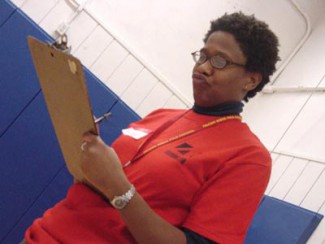
Playing this game on the playground with friend or enemies is a blast. But sometimes you might want to keep an official score and determine who is the best four square player in town. We get a lot of questions about how to design and rank players in various types of tournaments. Here are a few ideas on how you can build your own fun tourney.
Elimination Tournament
This tournament design measures the survivability of a group of players by throwing out people who have been eliminated (see the Rules) during game play. The longer a player stays in on the court the better she will do in the tournament, at least until all the less skilled players have all be eliminated. Here are a couple principles and tips for an elimination tourney:
- Keep track of the number of times a player is eliminated, either on paper tracked by a referee or with pieces of tape stuck on a player's jersey.
- Have multiple rounds in the tournament to give players a chance to "reset" their elimination count between rounds.
- Use an announcer or other personality to periodically call attention to which player is in the lead.
- Have something to do for players who were eliminated early, such as consolation games or other activities.
- Set a time limit for total play time, and give warnings as time comes close.
King-of-the-Hill Tournament
Unlike an elimination tournament, this type of competition rewards players for battling their way to the highest ranking square and staying there. Have players count out the number of rounds they have remained in the highest square. Players become the "King of the Hill" as they eventually break a prior record of the highest number of rounds remaining in the highest square. This is a fun tournament that doesn't require a lot of supervision and it is also the basis for score keeping during the Four Square World Championships.
- Players should yell out their count loud enough that everyone in the competition can hear.
- Record the high records in a permanent place if you wish to carry the tournament over many days.
- Offer a reward for holding the King of the Hill title.
- This kind of tournament encourages players to gang up on individuals who are approaching a new record. Supervise for bad behavior!
Long Term Tournament
Groups of players that wish to compete with each other over a period of time are encouraged to try this type of tournament style. If ten people were committed to playing every day at the same time then it is likely that some number of players could not make it on certain days or not arrive on time. This type of tournament tabulation is forgiving of players who had exceptionally good and bad days and calculates an average for each day played. But it is also intensive on supervision and score keeping, as it requires that every action be recorded and calculated after each match. This type of scoring was used by the Boston are adult four square league for 9 years.
In principle, to rank player's success in relationship to other players, you can get a number that represents their success by finding the average between the number of times a player entered the court into the lowest square and remained on the court in the highest square. A player who enters the court once and remains in the highest square once would have an average of 1.0. Higher averages mean a player remained in the highest square longer, lower scores means a player failed to reach the highest square more often. A season average compares how a player performed regardless of their success or mix of competition on any single day.
- Give a player an "entrance" point each time she enters the court in the lowest square. Give a player a "serve" point each time she serves from the highest square.
- Divide the number of serves by the number of entrances to get an average for a day of play. Compare averages across a season to find the winner.
- Consider a mechanism to drop the highest and lowest daily averages to further factor out fluke scores, much like the Olympic judges in style competitions.
- Assign people to keep scores. This kind of score keeping is intensive.
